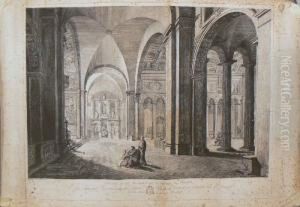Antonio Sarti Paintings
Antonio Sarti was an Italian composer known mainly for his operatic works. Born on January 1, 1729, in Faenza, Papal States, Sarti was initially educated in the musical traditions of the church. His early training was as a choirboy in his native city, and he later studied under Padre Martini in Bologna, who was one of the most eminent music teachers of the period and taught several other notable composers including Mozart's rival, Antonio Salieri.
Sarti's career as a composer began with the production of his first opera, 'Pompeo in Armenia,' which was performed in Venice in 1760. This debut was a success and helped to establish his reputation. He was prolific in his opera compositions, and his works were performed across Italy and beyond. His operas were known for their melodic inventiveness and the skillful orchestration.
In addition to operas, Sarti composed a significant amount of sacred music, including masses, motets, and psalms, which reflects his early musical upbringing and his connection with the Church. His religious works were well-received and contributed to his appointment as maestro di cappella at the court of Copenhagen to King Christian VII of Denmark in 1775.
Sarti's influence extended through his teaching as well as his compositions. In 1784, he took the young Giuseppe Sarti (no relation), who would later become a celebrated composer in his own right, under his tutelage. Furthermore, Sarti's own compositions influenced other composers. For instance, Mozart is known to have admired Sarti's work, and his opera 'Fra i due litiganti il terzo gode' is believed to have inspired Mozart's 'Don Giovanni.'
Antonio Sarti's career took him across Europe, and he enjoyed considerable success in Russia where he was invited by Empress Catherine the Great. In Russia, he served as the director of the Italian opera, and he became a central figure in the musical life of St. Petersburg. His last years were spent in Russia, where he continued to compose and perform until his death on July 28, 1802.
Throughout his career, Sarti maintained a healthy output of compositions, although today he is not as widely recognized as some of his contemporaries. His contributions to the development of opera, particularly in the use of the ensemble and the integration of dramatic elements in musical structures, were significant. Despite his death, his music continued to be performed well into the 19th century, though much of his work has since fallen into obscurity.
